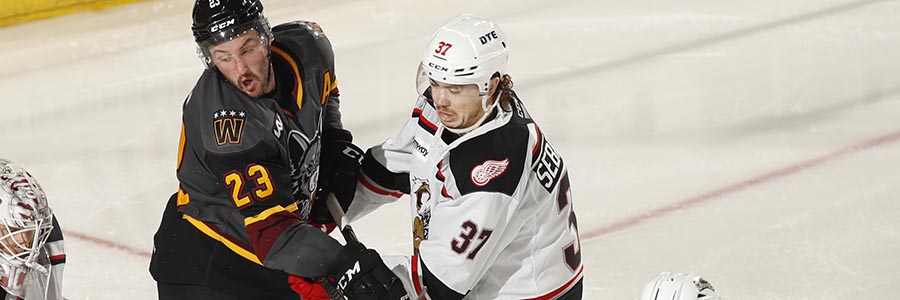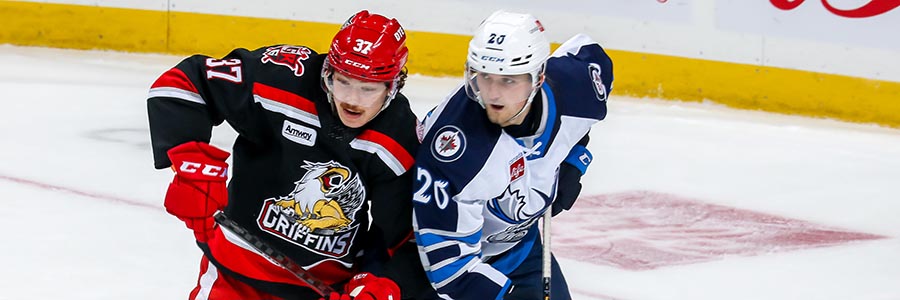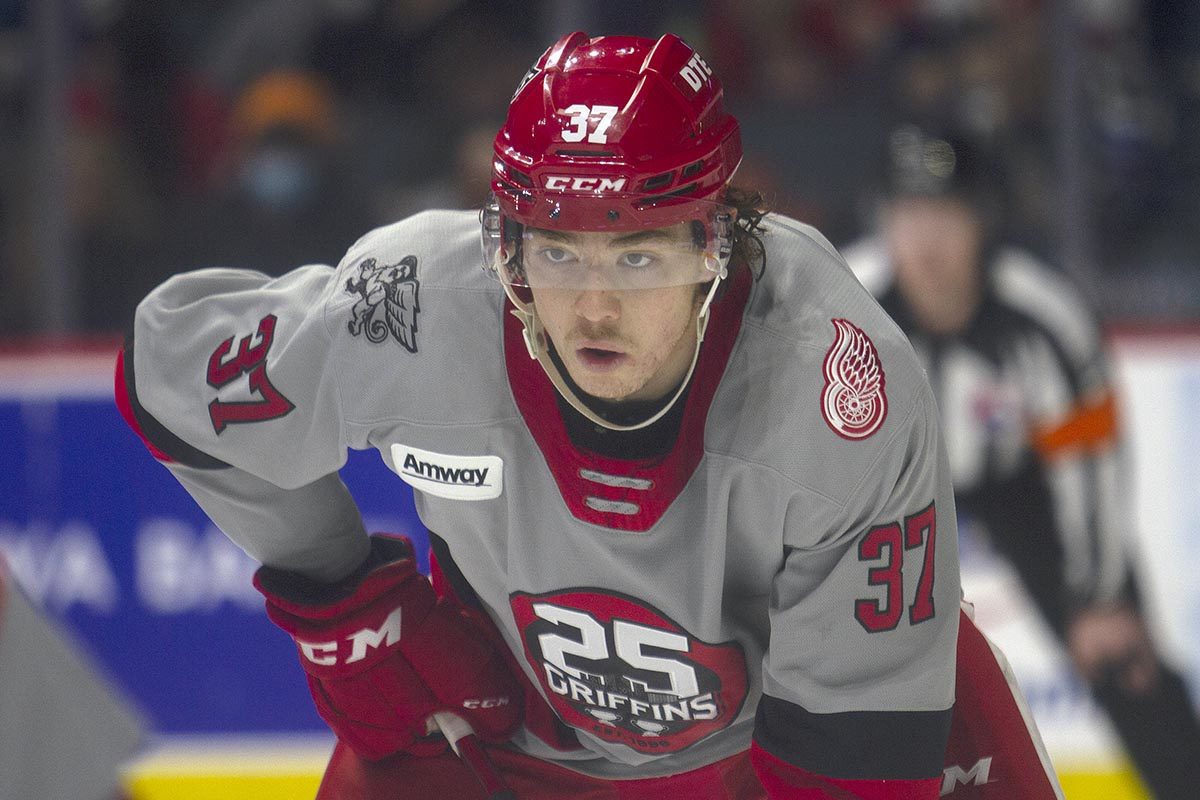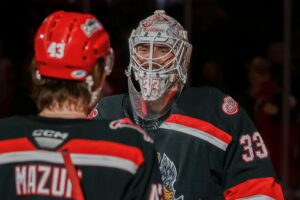📝 by Mark Newman | AHL On The Beat
Under normal circumstances, Grand Rapids Griffins defenseman Donovan Sebrango likely would be playing his final season in the Ontario Hockey League right now, using his last teenage year to fine-tune his play in preparation for the pros.
Obviously, these are not “normal” times.
Turn back the clock to January 2021, when hockey in Canada and the United States was in limbo due to the coronavirus. Like others his age, Sebrango ― who had just turned 19 ― was willing to play almost anywhere in hopes of continuing his development as a promising prospect of the Detroit Red Wings.
He headed to Slovakia, a part of the world that was not completely unfamiliar to him. Sebrango had been a member of the silver medal-winning Team Canada at the 2019 Hlinka Gretzky Cup summer tournament, which was held in Breclav, Czech Republic, and Piestany, Slovakia.
Playing in the Extraliga, the highest-level ice hockey league in Slovakia, Sebrango saw action in five games. He recorded a goal and two assists before getting the news that he was going to play for the Griffins during the abbreviated 2020-21 AHL season.
Thankfully, the Canadian Hockey League rule that prevents 19-year-olds from playing in the AHL was waived. Typically, teenagers are constrained to their junior teams unless they can make an NHL roster.
“The original plan for me was to play in Slovakia until the OHL started, but then I got word that I was heading to Grand Rapids and the rest is now history,” he said. “A lot of my old teammates weren’t playing, so I was grateful just to get some games in. I got something good out of a bad situation.”
Advancing to the AHL was a big test for Sebrango, who was the fourth-youngest defenseman in the league last season. Challenges, however, were nothing new for the Ottawa, Ontario, native.
As a good Canadian, he started skating at a young age. He was not enthusiastic at first.
“I don’t remember how old I was, but I remember not liking it at first,” he said. “When I was super young, I remember not being a fan of it and wanting to quit. I wasn’t forced, but I was gently pushed to get out there again and I ended up loving it.”
Sebrango leaned heavily on the support of his mother, Kim, who had fallen in love with the sport of hockey as a young girl. She was a big fan of goaltender Glenn “Chico” Resch, who played 14 seasons in the NHL, including 1979-80 when he won a Stanley Cup with the New York Islanders.
As a single mom, she made sure that Donovan and his older sister, Gabby, had everything they needed to excel. She knew her son had athletic potential, having inherited physical skills from her former husband, Eduardo Sebrango ― Donovan’s dad ― who had been a member of the Cuban national soccer team before playing professionally in Canada for the better part of a decade.
Even as a boy, Sebrango was singularly focused. Kim had once described her son as “stubborn” before softening her assessment to the more palatable “determined.”
“Depending on who you asked, I could be either one of those,” he agreed. “Since I was young, I knew what I wanted and nothing was going to get in my way until I got there. I think my mom realized that, too, so she helped me along the way. Some days, you could ask her and she would have said I was stubborn. Other days I was just driven. It all depended on the day.”
Sebrango no longer remembers why he became a defenseman, but it’s the only position that he has ever known. “Once I had been playing the position for a while, I saw no reason to change,” he said.
He showed a superior skill set and a strong hockey sense that exceeded his years. By grade 8, he was heading for the Canadian International Hockey Academy, a school where the curriculum is designed to prepare students for the rigors of future careers in the sport, combining quality education with an elite hockey experience.

“Talking to my mom, we felt it was the right decision for me to get ready for the next phase, which was junior hockey,” he said. “Moving away gave me an early step, just living on my own, and it helped make the transition to playing junior a little easier. Some of my best memories in minor hockey were at CIH and it was the best decision I made.”
Sebrango was originally slated to play for the school’s varsity squad, considering he was a year too young for the major bantam team. He quickly proved he was ready to play above his age group, dressing for the majority of the season and tallying 11 points in 29 games.
Although he struggled with some homesickness, Sebrango stayed, determined to push forward. He was named a captain for his second season at the school when he scored 29 points in 30 games, tops among the team’s defensemen.
“Everything I did centered around hockey,” he said. “Living with your teammates in the same dorm, going to school with them, allowed me to get close with the guys. It was great for my development. Weight training, for example, was relatively new to me because I was still growing, but once I knew what I was doing, it was something I took advantage of. Not every kid gets to be in the gym every day, especially at that age.”
If Sebrango was not an all-star in the classroom, he knew how to hit the books.
“I wasn’t always a fan of school, but I knew if I wanted to play hockey, I had to be a good student,” he said. “It’s kind of cliche, but it’s also true. Going to a hockey school, if you didn’t get your work done, you didn’t get on the ice. That motivated me to get my work done.”
At the age of 15, he verbally committed to Boston University, planning to start his college hockey career in 2020-21. Eight months later, he changed his mind.
“[Going to Boston University] felt right for me and my family at the time, but it didn’t end up working out,” Sebrango said. “It had nothing to do with the school. Some things changed and it just made more sense for me to play junior. It became clear that junior hockey was going to be a better option.”
Sebrango signed with the Kitchener Rangers after the team chose him in the second round (40th overall pick) in the 2018 OHL Priority Selection.
In Kitchener, his game took another step forward, thanks in part to one of the team’s assistant coaches, Dennis Wideman, a former NHL defenseman who played 815 games with St. Louis, Boston, Florida, Washington and Calgary before his retirement in 2017.
“He was a big mentor,” Sebrango said. “Watching video with him and being able to pick his brain helped me a lot. He showed me the way, so he was definitely a big help in my development. My time in Kitchener was the best couple of years of my life. We had a great group of guys, we really bonded, and we had a great run before COVID took us out.”
Kitchener went 33-6-0-3 after Mike McKenzie took over the head coaching reins 21 games into the 2019-20 season. A full dozen of the Rangers were NHL draftees, including Sebrango, who was chosen in the third round (63rd overall) by the Red Wings in the 2020 NHL Entry Draft.
Sebrango’s excitement at being chosen by an Original Six team was tempered by the truth of a highly transmissible virus that had turned the sports world upside down. Indeed, it was a troubling situation for people from all walks of life, including young hockey players hungry for ice time.
“When you’re not playing and not doing what you love, it takes a toll on you, especially when you’re not sure whether you’ll ever get to play,” he said. “Once we found out that it was going to take some time before we would be able to play here (in North America), I went over to Europe and played there.”
While Sebrango enjoyed his short-lived sojourn to Slovakia, he was thrilled when he learned that he would be able to play with the Griffins last season. He made his pro debut on Feb. 11, 2021, in Chicago, then recorded his first point (an assist) in his seventh AHL game.
“Everyone is another level [better] compared to junior hockey, so it took a few games to get adjusted,” he said. “Everyone is faster, everyone is stronger, but once you get adjusted, you realize it’s the same game that you’ve been playing for a while. When you start to gain more confidence, you can stick to playing your game. You adapt.”
His adjustment to the AHL was made a little easier with the help of teammates who did what they could to make him feel more at ease, even when the league’s coronavirus protocols played havoc with team ideals like camaraderie and esprit de corps, concepts that were tempered by social distancing requirements.
“Everyone helped me out,” Sebrango said. “Being good teammates, they made me feel comfortable in the room, which allowed me to gain some confidence. The coaching staff showed they believed in me by giving me playing time, which enabled me to feel more comfortable.”
Sebrango played in all but one of the Griffins’ 32 games last season, recording four assists in the process.

He went into this past summer unsure where he would play. Normally he would have been ineligible to play in the AHL, but the NHL was able to negotiate a one-time exception for those players who took part in at least 20 AHL contests during the 2020-21 season when their junior teams were not operating.
Being sent back to the OHL could have been viewed as a step back in his development.
“When I got the word that I was going to be able to play in the AHL again, I was definitely excited,” he said. “I was ready to get going with a ‘normal,’ or at least a full, season in Grand Rapids.”
Twenty games into this season, Sebrango got one last chance to compete with players in his age group when he was named a member of Team Canada for the 2022 IIHF World Junior Championship. The 10-team tournament was scheduled for Dec. 26-Jan. 5 in Edmonton and Red Deer, Alberta.
“It was a surreal feeling once I got the word, almost a feeling I can’t describe,” he said. “It’s a huge honor.”
Sebrango was one of the final cuts at Canada’s camp the previous year, so being named one of the eight defensemen on the 2022 squad was a moment he will never forget. “I called my mom right away, seconds after I found out,” he said. “She was crying as soon as I told her. She couldn’t believe it.”
Representing his country on the world stage was an honor that Sebrango was more than happy to share with his mom.
“She’s my rock. She’s my everything,” he said. Growing up, as a single parent, she had to be a father and a mom to me. I owe the world to her.”
He wasted little time in showing that he meant business. In Canada’s opening game against Czechia on Dec. 26, he quickly set the tone by hammering Buffalo Sabres prospect Jakub Konecny with an open-ice hit in the neutral zone, a play that elicited cheers from the Canadian faithful.
Playing physical and fearless is nothing new for Sebrango.
“It’s definitely been a part of my game for a while and it’s something that keeps growing as I keep growing,” he said. “I think I’m a bit of an old-school defenseman with a little bit of new school. I think I’m a pretty tough, gritty kind of guy. But I think I add offense, so I got a little bit of the old-age hockey in me and a kind of new-era offensive defenseman.”
In his world junior debut, Sebrango topped his check of a Czech by scoring the game-tying goal late in the first period. Capitalizing on a perfect backhand pass from Winnipeg rookie Cole Perfetti, he knotted the score at 3-3 on the way to his team’s 6-3 victory.
“It was an incredible feeling, especially since I hadn’t scored in awhile,” he said. “Getting that goal meant everything to me and having my mom there made it even more special.”
Canada defeated Austria 11-2 in its second game, but the rest of the tournament was canceled as the Omicron variant of the coronavirus continued to spread.
Sebrango was disappointed by the premature end of the event, but he was pleased that he was able to experience the excitement around it, even on a limited basis. “You’re grateful for every moment you’re there,” he said. “Even though it was cut short, I wouldn’t take back any time I spent there.”
Upon his return to Grand Rapids, he scored his first pro goal in his second game back. He knows his offensive play is still a work in progress, but while his reputation will be built on being a shut-down defenseman, he hopes he can be counted on to chip in points when needed.
“When you’re playing in the AHL, you realize that it’s a tougher league,” he said. “When you’re playing against seasoned pros, it’s definitely more of a challenge. You can’t take any shifts off or any nights off. You have to be ready to bring it every night.
“I realize that this is my league now and where I will be playing for a bit. I do what I’m asked to do and then see what happens from there. My confidence is good because my teammates and coaches believe in me. It feels good to have them on my side.”
Sebrango feels he is in a good place. His mom visited for a couple of weeks recently, which he says was “a good feeling.”
“Being able to look up in the crowd and seeing her in Grand Rapids was great,” he said. “It was good to show her where I’ve been living. I love it here. I’m playing with a great bunch of guys and great coaches. I have nothing bad to say, so I’m having fun.”
He realizes that he has been fortunate to pursue his dream in less-than-ideal circumstances created by the coronavirus.
“It’s been a weird couple of years, but circumstances switched things around and pushed me forward,” he said. “I’m grateful for everything that has happened for me so far.”






































